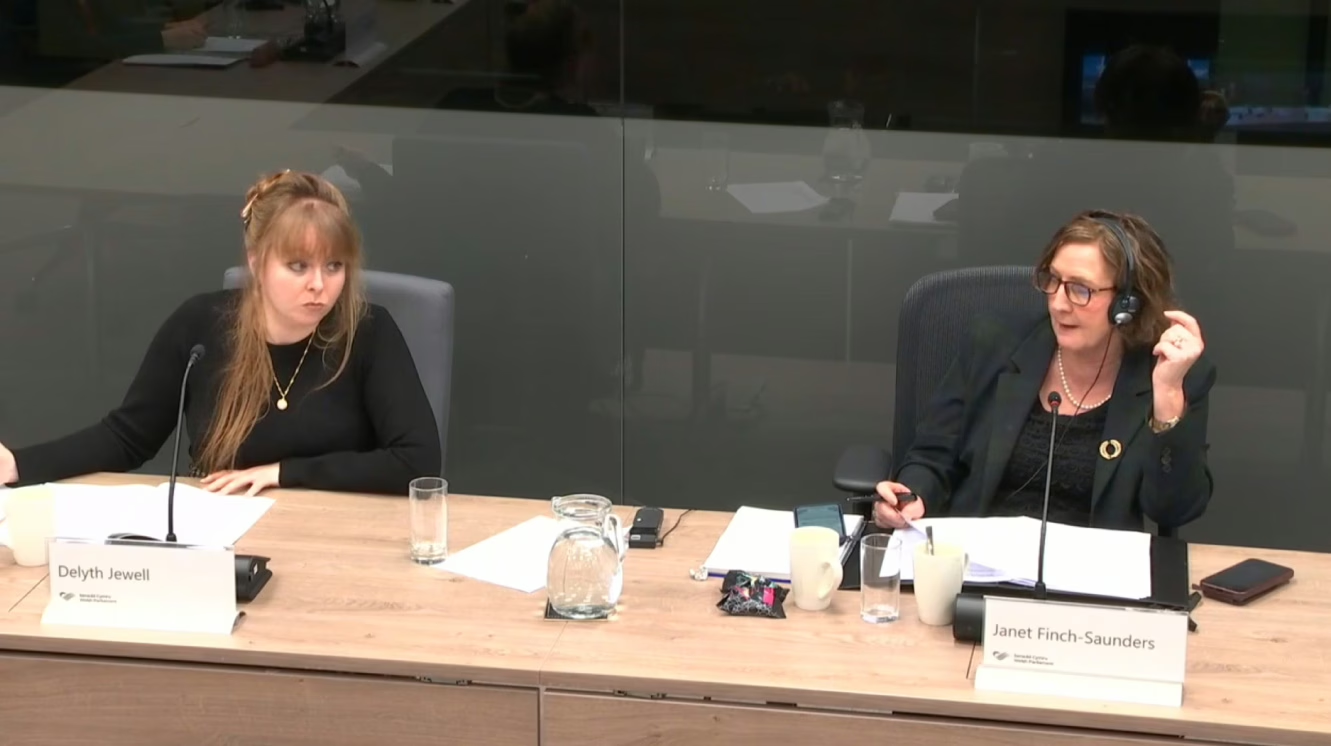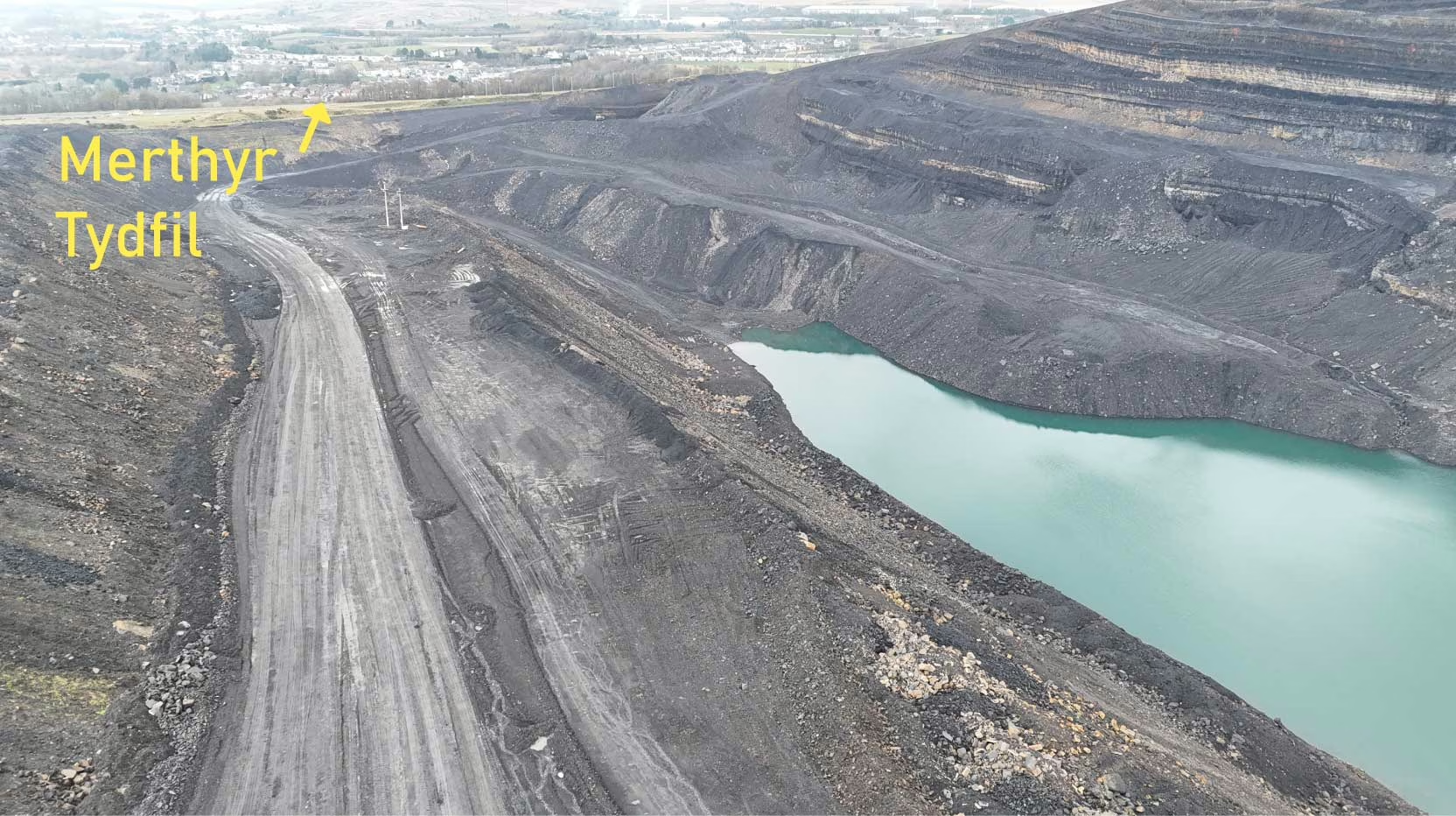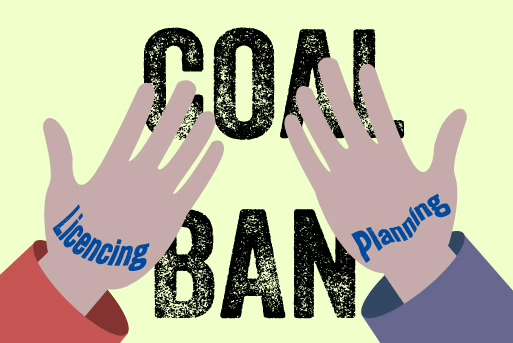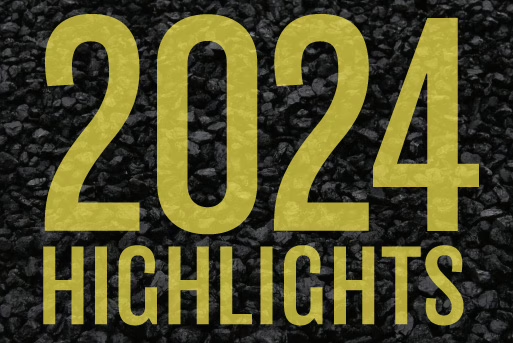
In February, CAN gave oral testimony to the Climate Change, Energy, and Infrastructure Committee (CCEIC) on the Disused Mine and Quarry Tips (Wales) Bill. Alongside FOE Cymru, we gave a candid account of the strengths, weaknesses, and pitfalls of the Bill. Watch our session in full.
The CCEIC is the first committee scrutinising The Disused Mine and Quarry Tips (Wales) Bill passing through the Senedd, giving it significant scope to shape the Bill at an early stage. CAN successfully persuaded the CCEIC during our oral testimony to make key recommendations to the Welsh Government to improve the Bill in its Stage 1 report:
The Welsh Government should provide further assurance that:
Coal Action Network was invited to attend Westminster where we gave evidence to the Welsh Affairs Committee in their inquiry about the environmental and economic legacy of Wales’ industrial past, alongside Friends of the Earth Cymru.
This inquiry was opened in December 2024 to examine the environmental legacy and economic impact of Wales’ historical heavy industries. You can find our written evidence here.
In our submission, we focused on the consequences today of old coal mines. Whilst we recognise the wealth it generated, much of that was kept by the Directors of mining companies whilst abandoning their restoration responsibilities to host communities. Our 2022 report ‘Coal mine restoration in South Wales’ documents this pattern in Wales’ recent past. We also highlighted the threat of new coal mining under the guise of remediation, as proposed in Bedwas, South Wales.

Merthyr (South Wales) Ltd operates the recently closed sprawling Ffos-y-fran opencast coal mine, next to the town of Merthyr Tydfil - home to around 58,000 people. In 2015, Merthyr (South Wales) Ltd agreed a restoration plan with Merthyr Tydfil Council, which - after coal mining ended - would see the landscape put back to before coal mining began and with extensive habitat improvement to support nature to return to the area. But as soon as Merthyr (South Wales) Ltd saw there was no more profit to be made, it claimed that it had failed to set aside enough of its profits to fund the restoration plan it agreed to deliver back in 2015. Rather than taking Merthyr (South Wales) Ltd to court over what would be a breach of contract and trust, Merthyr Tydfil Council invited the company to gut that restoration agreement by around £85 million in works, and with no punitive action against the company. This is despite all public records indicating Merthyr (South Wales) Ltd actually can afford the original restoration plan.
Within the last decade, Celtic Energy Ltd - another mining company, evaded well over £100 million in restoration costs and made a high quality restoration impossible at 4 opencast coal mines across South Wales. Communities living close to these sub-standard restorations still pay the price for Celtic Energy Ltd's profiteering. In fact, the Welsh landscape is littered with over 2,500 coal tips - abandoned by coal mining operations and now forming a huge burden estimated to cost £600 million to deal with.
Merthyr (South Wales) Ltd's attempt to evade the cost of the restoration it agreed to at Ffos-y-fran is therefore just the most recent instance of an industry that continues to cost some of the poorest communities in South Wales more than it ever gave them. But all is not lost for the 58,000 residents of nearby Merthyr Tydfil. We're standing alongside vocal campaigners in the area against this attempt by Merthyr (South Wales) Ltd to short-change the town of Merthyr Tydfil by £91.2 million in restoration funds. You can help us by taking 2 min to object to this application on the local council's website.
Restoration plans are supposed to return the land back to a better state than before coal mining began. In reality this rarely happens, but it somehow still convinces planners to grant permission for mining. The new plan to downgrade the restoration tries to shift this 'baseline' state of the land by 17 years from before coal mining began to just after coal mining stopped. This is so the new restoration downgrade only has to improve a Mordor-like landscape ravaged by 16 years of coal mining, drastically lowering the threshold. But there's no justification for setting this new starting point.
The new downgrade proposes to permanently leave huge health and safety hazards in a landscape that is in easy walking distance from the population of Merthyr Tydfil, even encouraging the public into this area. There are tangible risks to life and limb from a very deep flooded void, to a sheer cliff edge and massive coal tips, one of which has already suffered large slip. All of these hazards are supposed to be removed from the landscape at the end of coal mining, but Merthyr (South Wales) Ltd is putting its profits before people's lives.
The flooded quarry, Dorothea in Talysarn, Gwynedd is an abandoned quarry left in a similar state to what is now being proposed for Ffos-y-fran. But since 1990, there's been over 20 tragic deaths at Dorothea quarry.
3 colossal coal tips were supposed to be removed at the end of coal mining but the coal company wants to leave them where they are, despite the fact they leach toxic metals into the surrounding ecosytem, which it admits is home to protected Great Crested Newts. To make it worse, one of the many cuts to the previously agreed restoration plan is to stop maintaining the ponds which capture "chemical loads" from rainwater running off the colossal coal tips, admitting that they may 'silt up', which would potentially harm the endangered Great Crested Newts, as well as spread the "chemical loads" further into rivers and streams.
In one of the most blatant greenwash attempts we've seen in a while, this coal company suddenly cares deeply for minimising CO2 emissions. This, it claims, is why it proposes to leave the 37 million cubic metres of mine waste, soil, and rocks in the three massive dumps its created, rather than refill the opencast void with it - as was the original plan. Earth-moving requires HGVs burning deisel... but the emissions spared by leaving behind 3 colossal coal tips overshadowing 58,000 people would amount to just 2% of the illegal coal mining Merthyr (South Wales) Ltd did over 15 months after its planning permission expired. If the void is filled in with the coal tips, it'll also provide a greater carbon sink cancelling out that CO2 of these earthworks even more. This isn't about CO2, its about money - which Merthyr (South Wales) Ltd want to turn into even greater profits.
One of the main cuts to the original restoration plan is to leave 37 million cubic metres of mining waste, soil, and rocks in 3 colossal coal tips scattered around the site and towering above nearby residents of Merthyr Tydfil by up to 210 metres, disfiguring the landscape forever. One of these coal tips, nearest to residential homes, has already suffered instability with a recent and large coal tip slip 2024. The combined pressures of climate change, illicit scrambler bikes, and time could create further instability and dangers.
Many coal tips require regular maintenance and all disused coal tips must be monitored for instability. Long after the coal company, Merthyr (South Wales) Ltd, has left with its tens of millions in profits, there will be ongoing maintenance costs likely to amount to millions and likely to be funded by tax payers.
Against official guidance, the aftercare period being proposed for nature restoration is just 5 years. Guidance recommends double this to 10 years to ensure tree and hedge plantings are successful before the coal company is allowed to wash its hands of responsibility. 5 years does not give long enough to see what plantings need to be replaced and to support the growth of those - instead, failed plantings will either be abandoned or the tax payer will have to pay for replanting and maintaining those areas.
Prior to opencast coal mining, the area formed part of the Gelligaer and Merthyr Common, an upland area of rough grassland grazed by sheep, cows and horses. Commoning is a way of life with a rich history dating back to 1066 and enshrined in the Magna Carta (1215).
The cuts to the original plan mean leaving behind a huge flooded mining void and 3 colossal coal tips. This will severely reduce the ability for Commoners to exercise their historic rights to graze their animals on the land. It also represents a broken promise to return this land to the Commoners after coal mining. Instead, the hazards that would be left behind pose risk of injury and death to the Commoners' livestock.
A whole way of life and a living part of our history is threatened by the cuts proposed to the original restoration plan, as well as the preservation of native Welsh breeds of sheep and cows like the South Wales Mountain Sheep, or Welsh Black cows.
Through the thick layer of greenwash, the real reason for trying to cut every corner on the original restoration plan is admitted by the company's representative: "It was established that there are insufficient funds available to achieve the 2015 restoration strategy and therefore an alternative scheme is required.". But it's a matter of public record that this is not true, with £91.2 MILLION set aside by the company to fund the original restoration plan. Merthyr (South Wales) Ltd even claimed tax discounts on this from HMRC.
We were invited for the second time to give oral evidence to the Climate Change, Environment, and Infrastructure Committee of the Welsh Parliament (Senedd) on 05th February 2025. We shared the panel with Haf, Director of FOE Cymru, to provide our opinion on the weaknesses, strengths, and improvements that need to happen for the Disused Mine and Quarry Tips (Wales) Bill to deliver real benefits for Welsh people living in the shadow of coal tips.
We emphasised that the The Disused Mine and Quarry Tips (Wales) Bill, in its current form, carries the very real risk that it could encourage 'remining' so-called waste coal from coal tips under the guise of making those coal tips safe. There is a live proposal to do exactly this for two coal tips in Bedwas, Caerphilly. Read more about coal tip re-mining and safety.
Our message to the Senedd Committee: include a provision in this new Bill prohibiting coal extraction for commercial gain from disused coal tips.
Watch our session with the Committee to find out how the pros and cons of the new Bill, not least encouraging 'remining' coal tips which contain up to 643 million tonnes of coal, emitting up to 1.7 BILLION tonnes of CO2.
In April 2024, we were invited to give oral evidence on Welsh coal mine restoration, with a focus on Ffos-y-fran opencast coal mine. Check out this video of our debut session with the Climate Change, Environment, and Infrastructure Committee.
Mining company: Merthyr (South Wales) Ltd (MSW) is the current operator of the sprawling opencast coal mine, Ffos-y-fran, in Merthyr Tydfil, South Wales.
Claim: MSW claims "It was established that there are insufficient funds available to achieve the 2015 restoration strategy and therefore an alternative scheme is required." (EIA Scoping Report, July 2024). It is on this basis that a new application will be considered by Merthyr Tydfil County Borough Council.
MSW's 'solution': To downgrade the restoration scheme promised to surrounding communities to one that amounts to doing as little as possible. Even returning the tens of millions of cubic metres of coal tips to fill in the gaping void the company created and allowed to flood is considered "not feasible or economic" (EIA Scoping Report, July 2024)
Why MSW is offering to do any works: Merthyr Tydfil County Borough Council holds £15 million in an Escrow account that it forced MSW to pay into (by court order). This was never intended to fund the original restoration agreement costed at £75-120 million, but that is what's happening now as MSW is claiming the company doesn't have the finances to pay for the restoration it previously agreed to fund. MSW wants this £15 million so is proposing a massively downgraded restoration plan and presenting this as the only option so the Council will pay this out to them. The Council is afraid the company will walk away if it is compelled to honour its contractual agreement to fund the restoration itself. If that happens, the Council would have to pay a new company to come in to restore the site, which'd cost more.
Our recommendation: Merthyr Tydfil County Borough Council has refused to pursue MSW to deliver on the contractually agreed level of restoration, and is poised to consider a downgraded plan by MSW which would affect surrounding communities living in Merthyr Tydfil for generations. Haven't they put up with enough after 16 years of coal mining, dust, and noise pollution? The Welsh Government urgently needs to launch an inquiry MSW finances and the Council's actions, issuing a 'holding directive' to prevent the Council approving the downgraded plan in the meantime.
To our knowledge, there has been no evidence submitted by MSW that it cannot fund the full restoration it is contracted to undertake. On the contrary, MSW's most recent, publicly available, financial statement on Companies House says "during the year the directors again reassessed the restoration provision based on current operating costs in particular diesel prices which have decreased significantly and increased plant hire costs, which as a result increased the restoration provision by £0.2m to £91.2m", by 31 Dec 2023, admitting record profits the year before, with its ultimate parent company, Gwent Holdings Ltd, reporting "The average coal price achieved increased by 94% to £151.66 per tonne" in its 2022 filing. This funding for restoration was based on Ffos-y-fran closing at the end of its planning permission in September 2022 - but it continued illegally mining coal for over a year after that, and even outside its licenced area, selling an extra 640,000 tonnes of coal - driving profits even further.
It's been claiming tax discounts to HMRC each year by phasing expected restoration costs that it now refuses to pay. This report goes on to say "The total costs of reinstatement of soil excavation and of surface restoration are recognised as a provision at site commissioning when the obligation arises. The amount provided represents the present value of the expected costs.".
This very much sounds like the company able and prepared to pay the restoration costs, and had already claimed tax discounts for it. So why is the company being allowed to duck tens of millions in what it owes?
As is typical of the mining industry, operations and financing is done through a complicated constellation of interconnected companies owned by family members (depictions of which are illustrative only and not based on any likeness). This kind of practice could help evade liabilities - though we're not suggesting that was the intention here. The following information is accurate to the best of our knowledge, please refer to Companies House for confirmation/further details:



David Lewis has already been convicted of criminal fraud, with Judge Durham-Hall telling Lewis: "When the truth was put before you you wriggled, twisted and whinged" and described Lewis as "a pathological gambler who demonstrated pathological dishonesty", concluding "What he did was unlawful, crass, stupid and dishonest." *we believe this article refers to the same David Lewis that is currently Director of MSW but will consider evidence to the contrary, so get in touch before you threaten to sue us again David 😉

The UK Government launched a consultation on a limited review of the National Planning Policy Framework (NPPF) for 8 weeks from 30 July to 24 September 2024. The NPPF is an influential document that shapes planning decisions and priorities across England. It is periodically updated by the Government, following a public consultation. Although this consultation was focused on just sections of the NPPF relating to house-building and economic infrastructure, we felt this was a good opportunity to align the NPPF with the stated policy of the current UK Government not to licence any new coal mines.
The UK Government has committed not to licence any new coal mines - a function of the Mining Remediation Authority (previously, The Coal Authority). However, licencing may not apply to all types of coal mining so it is important to also prevent planning permission from being given to any new coal mining applications in a 'double lock' approach. We therefore recommended that the following changes to the NPPF -
The following text should be removed entirely:
221. c) indicate any areas where coal extraction and the disposal of colliery spoil may be acceptable;
221. d) encourage the capture and use of methane from coal mines in active and abandoned coalfield areas;
221. e) provide for coal producers to extract separately, and if necessary stockpile, fireclay so that it remains available for use.
and:
223. Planning permission should not be granted for the extraction of coal unless:
223. a) the proposal is environmentally acceptable, or can be made so by planning conditions or obligations; or
223. b) if it is not environmentally acceptable, then it provides national, local or community benefits which clearly outweigh its likely impacts (taking all relevant matters into account, including any residual environment
should be replaced by:
223. Planning permission should not be granted for the extraction of coal.
In an e-action we organised, 2,130 supporters and member of the public contributed to the NPPF consultation to demand planning permission for new coal mining is ruled out. A little concerningly though, the Ministry of Housing, Communities & Local Government only counted 1,867 emails calling for this. Even at 1,867 emails, that means, of the 10,981 emails in total that the consultation received, 17% - or almost 1 in 5 - was a demand to rule out planning permission for new coal mines.
The overwhelming consultation response for the UK Government to implement its stated position against new coal mines in the NPPF presented an early opportunity for joined-up policy-making by the new Government between the Ministry of Housing, Communities & Local Government and Department for Energy Security and Net Zero. Without this 'double lock', coal mining companies could still apply for - and obtain - planning permission for new coal mining. Theoretically, a standard coal mine still wouldn't be able to proceed because it's unable to obtain the licence, which it needs in addition to planning permission - but which the UK Government has said it would refuse.
HOWEVER, if the coal to be mined is not from a virgin coal seam (see mining coal tips), the project does not require a licence in addition to planning permission. There is well over 600 million tonnes of coal that this applies to across the UK. That's exactly why planning permission, as well as licences, needs to be categorically ruled out for new coal mining projects. Due to their complex nature, processing new coal mining applications also creates a large burden on over-stretched local planning authorities. The current wording of the NPPF creates an ambiguous and complicated assessment process for local planning authorities which our proposed wording would have simplified.
In this case of the left hand not speaking to the right hand, we hope the UK Government recognises the value of working more closely with non-governmental and civil society organisations seeking to support its stated policy aims.
In its environmental statement, Bryn Bach Coal Ltd attempts to present the anthracite coal it wishes to extract from an expansion of Glan Lash as a unique and scarce commodity that is needed for water filtration, bricks, and graphite, and would therefore be too valuable to burn. Yet, visiting Energybuild Ltd’s website will demonstrate that anthracite coal is currently being produced in large quantities at Aberpergwm. It is this coal that Bryn Bach Coal Ltd currently washes and sells to both burn and non-burn customers. This proves that Glan Lash anthracite coal is not unique or scarce, and just because it is of a carbon-content suitable for water filtration does not prevent it being also sold for combustion. Indeed, anthracite coal from Aberpergwm is also currently sold to heat greenhouses in the Netherlands to grow tomatoes into the cold season, according to Energybuild Ltd’s website.
For example, the three local water filtration companies that Bryn Bach Coal Ltd refer to are listed as customers on Energybuild Ltd’s website, along with Ibstock Ltd, the brick manufacturer, which Bryn Bach Coal Ltd claim would buy its Glan Lash coal. Therefore, coal supplied to any of these customers from Glan Lash would compete with coal from Aberpergwm, which could instead be supplied to combustible uses (as the High Court has confirmed that the displacement argument with coal are fallacious as coal is simply sold to different markets). It is also unlikely that separation would be maintained between anthracite coal from Glan Lash and anthracite coal from Aberpergwm, rendering record-keeping on respective customers a fiction.
In light of the local demand for our anthracite and letters of intent for supply we are able to ensure that 100% non-thermal-non/fossil fuel use will be achieved should planning permission be granted. This can be monitored by submission of yearly declarations from our customers stating tonnages purchased and its end use. It would not make economic sense for Bryn Bach Coal Ltd to change market strategy as poorer quality cheaper anthracites can be used as a fossil fuel. It can therefore be stated that this is not a fossil fuel application as the anthracite will not be used as an energy source this is an application to mine a mineral. P23
“Letters of intent for supply” can be binding or non-binding. As Bryn Bach Coal fails to specify which it has, we must assume it is “a non-binding letter of comfort” which “are merely expressions of hope” – ERDC Group v Brunel University [2006] EWHC 687 (TCC) – HH Humphrey Lloyd QC at para [27]. We understand that, without planning permission, Bryn Bach Coal Ltd may be unable to obtain binding letters of intent or contracts, but the fact remains, that its so-called ‘letters of intent’ therefore amounts to nothing more than pillow talk.
Bryn Bach Coal Ltd will know that there’d be no consequences for its planning permission if it supplies Glan Lash coal to its existing customers for home heating and other combustion uses. Section 106 agreements cannot control or monitor customers or customers’ use of the coal. Bryn Bach Coal Ltd also cannot predict the market volatility over the next 6-7 years affecting its various customers, and their demand for anthracite coal. Just as Bryn Bach Coal Ltd currently supplies anthracite coal to fossil fuel customers, it is likely to do so again with Glan Lash coal should the market conditions make it favourable to do so.
This exception has been accomplished firstly as Bryn Bach Coal Limited being the largest supplier of anthracite to the British brick manufacturing industry. Between 0.5-1.0% anthracite is used in the clay mix within each brick to react with the clay and add colour & carbon should the clay require additional carbon. This use as a brick colourant means the anthracite is not burnt and therefore does not release CO2 into the atmosphere... Ibstock Brick PLC is a long-standing customer and we have been supplying anthracite since 2005. A letter of support has been included and it must be noted that with the UK Government pledging to build 1.5 million new homes demand for bricks will undeniably increase. P24
Ibstock’s kilns fire bricks at heats exceeding 1,000c – and Energybuild Ltd, which operates Aberpergwm coal mine, confirms “The coal does combust…”, so the EIA’s claim that the anthracite is not burned or released CO2 appears to be ostensibly false, again throwing into question the credibility of other claims around the proposed consumption of coal from the Glan Lash expansion. Our research also suggests that anthracite is not required to “react with the clay”, and therefore invite Bryn Bach Coal Ltd to reference their claim. Furthermore, it may be that there are suitable alternatives to anthracite as a brick colourant, given the range of minerals used to currently produce different colours; “the body colour is largely dependent on the clay type, however, variation can also be achieved through methods such as body staining, surface sanding, staining or altering firing conditions” – Brick Development Association, 2023. The necessity of anthracite coal for British brick production is far from clear so should not be a material planning consideration until Bryn Bach Coal Ltd is able to substantiate its claims with accurate references, as we have.
Secondly Bryn Bach Coal Limited is a supplier to the water filtration industry where the anthracite is used as a filter medium in the water industry, the anthracite from the original Glan Lash site supplied three local Ammanford based Filter Media businesses. The anthracite is used in filter beds to purify drinking water, in de-salination plants and in sewage beds. Again, the anthracite use is non-thermal and does not release CO2 into the atmosphere. There are 3 Ammanford based filter media manufacturers and jointly employ over 100 people. The 3 filter media manufactures are long standing customers and with Celtic Energy having ceased operations there is a desperate shortage of premium quality anthracite. Letters of support annexed to this report. P24
These three filtration companies are currently being supplied by the large Aberpergwm deep coal mine which has permission to mine 40 million tonnes more anthracite until 2039 and which describes its own coal as a “source of high-grade anthracite” – again proving false the claim that “there is a desperate shortage of premium quality anthracite”. The reference to Celtic Energy is even stranger, since the four mines operated by Celtic Energy produced largely thermal coal, not anthracite. We respectfully suggest that this whole section of the EIA (as amended in Nov 2024) is revisited by Bryn Bach Coal Limited.
Even if the coal is not burned, the mining of coal releases methane into the atmosphere with a far higher climate change intensity than CO2. According to Veolia, industrial water treatment contractor, “quartz sand, silica sand, anthracite coal, garnet, magnetite, and other materials may be used as filtration media. Silica sand and anthracite are the most commonly used types.”. The existence of alternatives to anthracite clearly exist and should be encouraged, given the methane dimension of anthracite and propensity for it to also be sold for combustion, once mined – just as Aberpergwm anthracite coal is currently. Maintaining and increasing the supply of anthracite coal ‘locks in’ the water filtration industry to rely on anthracite rather than invest in improving its less harmful alternatives.
“Developing markets for non-thermal-non fossil fuel uses are emerging especially using anthracite as a substitute for graphite which is a critical mineral essential to achieve Net Zero by 2050 (Glan Lash anthracite has 92% fixed carbon, natural graphite has 100% fixed carbon). The demand for graphite will increase from the current 1.6m tonnes per year to 8m tonnes per year if we are to achieve Net Zero by 2050 (World Bank 2020). The International Energy Agency estimates a 400% increase in graphite production will be required by 2040.”
Again, Bryn Bach Coal Ltd’s claims of non-thermal are misleading. Anthracite wouldn’t be used to fuel graphite heating as a fossil-fuel, but it certainly would be heated to extreme temperatures of 1,000c for ‘baking’ and up to 4,000c for ‘calcination’ to remove impurities making up 8% of the anthracite and stabilise the graphite end product. This would release greenhouse gasses in a similar way to if it were burned for household heating – there is little to distinguish between the two end uses in terms of climate change impact.
It should also be clarified that Anthracite wouldn’t be a substitute for graphite as such, it would be used to manufacture synthetic graphite – being one of several suitable carbon-heavy materials). But natural graphite and scrap graphite can also be used. Furthermore, the UK doesn’t manufacture any graphite – therefore, the anthracite used for this purpose would be exported abroad, undermining further Bryn Bach Coal Ltd’s arguments around saved travel emissions. Demand in the UK is also relatively low “UK is a small net importer of natural and synthetic graphite”.
“The importance of Anthracite has been highlighted in the European Union’s publication Sustainable EAF Steel Production and describes how Anthracite will still be required after this transition and how it will play a vital role as a foaming agent and a carrier of carbon in this type of Steel Production process. Tata Steel at Port Talbot will require Anthracite when the Electric Arc Furnaces start producing steel.”
Bryn Bach Coal Ltd’s EIA statement neglects to mention that the study it refers to is over a decade old (2013)…and concludes the very opposite of what this Bryn Bach Coal Ltd purports it to: “The results obtained have demonstrated the technical feasibility of the approaches used while the economical evaluation has showed the sustainability of replacing the coal with char from biomass, in addition to environmental benefits due to CO 2 reduction, even if at the moment there is not a real assessed market of charcoal for steelmaking purposes” - European Commission: Directorate-General for Research and Innovation, Echterhof, T., Baracchini, G., Pfeifer, H., Griessacher, T. et al., Sustainable EAF steel production (GREENEAF), Publications Office, 2013, https://data.europa.eu/doi/10.2777/44502.
A more recent follow-up study commissioned by the EU from the same authors reinforces the 2013 report findings “Industrial trials of EAF charging confirmed the feasibility of coal substitution and outlined the relevant process aspects.” And “The best slag foaming, comparable with the pulverised fossil coal injection has been obtained with virgin biomass. Outlined energy saving with EAF equipped for post combustion and tailored char production form low grade biomass showed that char utilization is economically sustainable.”
The misleading referencing and unsubstantiated claims made throughout this section of the EIA undermines the credibility of Bryn Bach Coal Ltd’s EIA overall, and should prompt Carmarthenshire Local Planning Authority to fact-check all claims made within it.
“The Glan Lash Revised Extension provides an opportunity to calculate a definitive amount of C02 emitted by the additional transportation requirements when importing the replacement tonnage of anthracite from China or Columbia…
Glan Lash Revised Extension tonnage=84,896 tonnes x 0.611t of C02 per imported tonne= 51,871 tonnes of additional C02 through importing anthracite from China compared to mining anthracite at the Glan Lash Revised Extension.
Glan Lash Revised Extension tonnage=84,896 tonnes x 0.231t of C02 per imported tonne=19,611 tonnes of additional C02 through importing anthracite from Columbia compared to mining anthracite at the Glan Lash Revised Extension.”
Anthracite coal is consistently and overwhelmingly imported into the UK from the EU – and as Bryn Bach Coal Ltd itself admits, it currently washes anthracite from neighbouring Aberpergwm deep coal mine. Again, Bryn Bach Coal Ltd misleadingly only provides scenarios of coal imports from China and Columbia, suggesting that this is where the UK imports the bulk of its anthracite from, and that tens of thousands of tonnes of CO2 could therefore be saved by expanding mining at Glan Lash. This scenario is again clearly detached from reality and deeply misleading.
Secondly, if Bryn Bach Coal Ltd realises its ambition to sell its coal for graphite production, that would require exporting anthracite abroad, further undermining any claims to transportation-related savings. It also remains the case that planning permission S106 conditions could not constrain Bryn Bach Coal Ltd selling more of its anthracite for export, since it claims to already meet local demand with coal from Aberpergwm and elsewhere.
Finally, and as mentioned above, the High Court confirmed that this substitution would have to be over 99% or the benefits of reduced transport are outweighed by the additional coal burned. That’s because demand for coal is influenced by the availability and price of supply – therefore, expanding the Glan Lash coal mine stimulates demand and ‘industry lock-in’ in the UK.
Disclaimer: information on this page is accurate to the best of our knowledge. We invite Bryn Bach Coal Ltd or other interested parties to submit corrections with evidence for our review and updates.
Over the past year, we've secured some massive victories. By taking part in our digital actions, supporters sent over 26,000 messages to the UK Government, MPs, Welsh Senedd members, Councillors, and companies to help consign coal to the history books in the UK.

The Disused Mine and Quarry Tips (Wales) Bill (‘the Bill’) was prompted by a series of coal tip landslides that occurred in Wales following storms’ Ciara and Dennis in 2020, including a major landslide of a disused coal tip in Tylorstown. The Bill seeks to update the Mines and Quarries (Tips) Act 1969, to more effectively manage the 2,573 coal tips and over 20,000 non-coal tips within Wales so they do not threaten human welfare, by reason of their instability. To drive this management framework, the Bill proposes to create a new public body – the Disused Tips Authority for Wales (‘the Authority’), which would assess, register, monitor and manage disused tips.
To prevent disused tips from threatening human welfare through instability. The aim is for the Bill to be preventative and proactive rather than reactive. The first section of the Integrated Impact Assessment discusses the need to anticipate impacts of climate change on tip stability, such as the trend of increasing rainfall and storms. It seeks to do this by:
The current categories of R,A,B,C, and D would be replaced by a simpler two-step assessment process. The first step would be a desk-based risk assessment, the results of which may recommend a subsequent full assessment.
Key changes introduced by the Bill include:
Context 1
The Integrated Impact Assessment claims the Bill does not deal with coal tip remediation, and does not increase the likelihood of movement and potential combustion of coal that can accompany coal tip remediation. The Assessment goes further to state that the Bill’s preventative action will reduce the need for coal tip remediation and works required after coal tip slips. Coal Action Network believes these claims to be sincere but inaccurate.
Coal tip remediation involving coal removal and earthworks is presented as a solution to permanently prevent future coal tip instability. It does not substantively differ from other actions such as irrigation to prevent instability.
The UK Government’s proposed coal licencing ban wouldn’t currently prevent ‘re-mining’ coal tips. Additionally the patchwork of laws and policies in Wales is failing to prevent mining companies extracting coal or bringing new applications for coal mining and extensions in the past few years, with Local Planning Authorities shouldering the burden. This Bill may inadvertently increase pressure on resource-strapped Local Planning Authorities by fuelling a new wave of coal extraction applications, such as the current proposal by ERI Ltd to ‘re-mine’ two coal tips in Bedwas in a practice that dates back to at least 1984.
ERI Ltd is a private company offering to permanently remove tip stability risks at no charge to the landowner (Caerphilly Council) in return for selling the extracted ‘waste coal’, which we believe would be an attractive prospect to other landowners facing coal tip liabilities under the new Bill too.
Our recommendation 1
To prevent the unintended potential for the Bill to encourage an industry oriented towards ‘re-mining’ disused coal tips under the guise of preventing future instability, we recommend that the Bill includes a provision prohibiting coal extraction for commercial gain from disused coal tips.
Context 2
In our context to recommendation 1, we outline how – in practice – the Bill may fuel an industry oriented towards ‘re-mining’ coal tips. As a result, the decision to exclude a full Climate Change Impact Assessment and Carbon Impact Assessment from the Bill’s Integrated Impact Assessment should be reversed.
Our recommendation 2
The Bill should be accompanied by a full Climate Change Impact Assessment and Carbon Impact Assessment, given the potential of the Bill in its current form to encourage applications for coal tip ‘re-mining’.
Context 3
Over 85% of disused coal tips (and 90% of coal tips with higher stability risks) in Wales are located in the South Wales valleys, and – according to the Welsh Indices of Multiple Deprivation – are based in communities classed as amongst the 10% most deprived in Wales. As the Government’s Integrated Impact Assessment outlines, preventing coal tip slips would benefit lives, land, and housing in these areas.
Our recommendation 3
To realise this benefit, it is vital that the design and execution of stability works on coal tips prioritise minimising potential impacts on the wellbeing of these socio-economically disadvantaged communities – for example in operating hours, HGV movements, flora clearance, restriction of public access to green spaces etc.

In 2023, CAN reached out to the Business Design Centre to alert them to the fact their upcoming conference will be funnelling money into some of the world's worst companies for human and environmental abuses. We were resoundingly ignored. We held an action outside the Centre for 3 days in the freezing cold to speak with all the investors going in, but the Business Design Centre kept its head in the sand.
So, at the end of 2023, we contacted B Labs, the company behind the 'ethical' B Corp status. We followed B Labs' complaints process after it materialised that the Business Design Centre (conference centre in London) was using B Corp status to greenwash hosting Europe's largest investment conference for mining around the world. We felt that the Business Design Centre should have to choose between hosting exhibitors accused of human rights and environmental abuses, or enjoy B Corp status. We hoped, faced with this choice, Business Design Centre would drop the conference - helping reduce the UK's support for coal and mining around the world, a key aim of ours...
...But B Labs reply, after 6 months, disappointed us with no commitment to take action on what is clearly incompatible with the "high standards of social and environmental performance" that B Corp status promises customers. So we - or rather, our supports and the public - took action!

As B Labs doesn't seem bothered was the public says, we asked supporters to contact other B Corps - who are effectively B Labs customers. Almost 20,000 emails were sent to over 60 B Corp status companies, asking them to take a stand with us, and for what their B Corp status is meant to represent. Emailers politely asked these companies to contact B Labs and ask them to make the Business Development Centre stop greenwashing its promotion of mining with B Corp status. We had a great response with companies wanting to defend their investment in B Corp status and expressing dismay that B Labs would extend B Corp status to a company acting so clearly against the principles of environmental and social care.
"xxxx have raised your concerns with B Corp"
"I am frustrated about the event, but I am really angry at the greenwash and hiding of the even"
"I ask that B Labs take prompt action to protect the reputation of the B Corp trademark that we pay for and showcase on our website... last year some of the worst mining companies in the world gathered under the B Corp trademark. This is appalling and I hope you understand how important it is to put a stop to this."

The B Labs team finally responded to some of these B Corp status companies with:
"As of 18 November this year, companies looking to certify, or recertify, will be subject to a new framework that more closely considers the nature of the relationship between the certifying company and their client’s harmful practices. We’ll ensure the Business Design Centre is aware of this new framework."
We still think B Labs could - and should - do more to encourage the Business Design Centre to drop the annual 'Mines and Money Conference' - but this is, at least, a start. It was great to see supporters and more ethical companies join together to challenge greenwashing.
Stay tuned to hear what we plan in 2025 to turn up the heat even further on the Business Design Centre, and all the ways that the UK continue to support coal mining and use around the world.